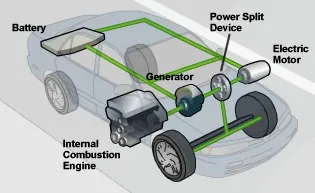20 common hybrid vehicle interview questions along with detailed answers

What is a hybrid vehicle?
Answer: A hybrid vehicle is a type of vehicle that utilizes two or more distinct power sources to propel it, typically combining an internal combustion engine (usually gasoline) with an electric propulsion system.
What are the advantages of hybrid vehicles?
Answer: Hybrid vehicles offer several advantages, including improved fuel efficiency, reduced emissions, potential cost savings on fuel, and often a smoother driving experience due to the combination of power sources.
Can you explain how a hybrid vehicle works?
Answer: Hybrid vehicles use a combination of an internal combustion engine and one or more electric motors. During certain driving conditions, such as low speeds or coasting, the vehicle can operate solely on electric power, while at higher speeds or when additional power is needed, the internal combustion engine kicks in.
What are the different types of hybrid vehicles?
Answer: There are several types of hybrid vehicles, including parallel hybrids, series hybrids, plug-in hybrids (PHEVs), and mild hybrids. Each type operates slightly differently in terms of how the engine and electric motor(s) work together.
What is regenerative braking in hybrid vehicles?
Answer: Regenerative braking is a feature in hybrid vehicles where the electric motor helps slow down the vehicle during braking, converting kinetic energy into electrical energy, which is then stored in the vehicle’s battery for later use.
How do hybrid vehicles achieve better fuel efficiency?
Answer: Hybrid vehicles achieve better fuel efficiency through various means, including regenerative braking, engine shut-off during idle periods, and optimizing the use of electric power in low-speed driving conditions.
What are the main challenges associated with hybrid vehicle technology?
Answer: Some challenges include the cost of hybrid technology, battery life and degradation, the weight of additional components, and the disposal/recycling of batteries.
What factors influence the efficiency of a hybrid vehicle?
Answer: Efficiency is influenced by driving habits, road conditions, battery health, vehicle maintenance, and the design of the hybrid system.
What is the difference between a hybrid vehicle and an electric vehicle (EV)?
Answer: Hybrid vehicles use both an internal combustion engine and an electric motor, while electric vehicles rely solely on electric propulsion, with no internal combustion engine.
How do you maintain a hybrid vehicle compared to a conventional gasoline vehicle?
Answer: Maintenance for hybrid vehicles is generally similar to conventional vehicles, but with additional considerations for the electric components and battery system. This may include periodic checks of the battery health and system diagnostics.
What are the environmental benefits of hybrid vehicles?
Answer: Hybrid vehicles produce fewer emissions compared to traditional gasoline vehicles, contributing to reduced air pollution and greenhouse gas emissions.
Can you explain the difference between a hybrid and a mild hybrid?
Answer: A mild hybrid has a smaller electric motor and battery compared to a full hybrid, providing limited electric propulsion and typically assisting the internal combustion engine rather than powering the vehicle independently.
What advancements do you foresee in hybrid vehicle technology in the near future?
Answer: Potential advancements include improvements in battery technology for increased range and efficiency, integration of renewable energy sources, and advancements in hybrid system design for even greater fuel economy.
How do hybrid vehicles perform in cold weather conditions?
Answer: Hybrid vehicles may experience slightly reduced efficiency in cold weather due to battery performance, but advancements in battery technology and thermal management systems are helping to mitigate these effects.
Can you explain the difference between a hybrid and a plug-in hybrid (PHEV)?
Answer: A plug-in hybrid (PHEV) has a larger battery capacity than a conventional hybrid and can be charged by plugging into an external power source, allowing for extended electric-only driving range.
How do hybrid vehicles contribute to reducing dependence on fossil fuels?
Answer: By utilizing electric power for propulsion, hybrid vehicles reduce the amount of gasoline consumed during driving, thereby decreasing dependence on fossil fuels.
What safety features are unique to hybrid vehicles?
Answer: Safety features may include high-voltage warning systems, isolation of electrical components, and protocols for emergency responders in case of accidents involving hybrid vehicles.
How do hybrid vehicles impact resale value compared to conventional vehicles?
Answer: Hybrid vehicles may retain their value well, particularly if fuel prices remain high and demand for fuel-efficient vehicles continues to increase.
What are some common misconceptions about hybrid vehicles?
Answer: Common misconceptions include concerns about battery life and replacement costs, doubts about performance compared to traditional vehicles, and misconceptions about overall environmental benefits.
Can you provide an example of a successful hybrid vehicle model and its impact on the market?
Answer: The Toyota Prius is one of the most successful hybrid vehicles, known for its high fuel efficiency and widespread adoption. It has had a significant impact on the market, popularizing hybrid technology and influencing other automakers to develop their own hybrid models.
You may also like
